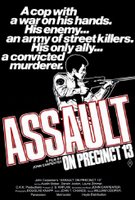Assault on Precinct 13 (1976)
 The expectation-challenging role reversals of John Carpenter’s Assault on Precinct 13 are but one of the silver linings to be found in what is one of the most efficient and startlingly restrained action films ever made, serving as both full-bodied entertainment and unstated political and social allegory (comparisons with Romero’s Night of the Living Dead are certainly appropriate). The film’s technical attributes are so tightly executed that admiration of them threatens to cloud the thematically rich underpinnings, but for as socially aware as the film is, it never fails to supplant the proceedings with tense interjections of charged violence and to the point, balls-on humor (no moment is more pointedly hilarious than when an adrenaline-charged black prisoner of the titular precinct, under attack, declares his intentions of carrying out his own devised escape plan, “Save Ass.”).
The expectation-challenging role reversals of John Carpenter’s Assault on Precinct 13 are but one of the silver linings to be found in what is one of the most efficient and startlingly restrained action films ever made, serving as both full-bodied entertainment and unstated political and social allegory (comparisons with Romero’s Night of the Living Dead are certainly appropriate). The film’s technical attributes are so tightly executed that admiration of them threatens to cloud the thematically rich underpinnings, but for as socially aware as the film is, it never fails to supplant the proceedings with tense interjections of charged violence and to the point, balls-on humor (no moment is more pointedly hilarious than when an adrenaline-charged black prisoner of the titular precinct, under attack, declares his intentions of carrying out his own devised escape plan, “Save Ass.”).Amidst youth gang riots by mindless rebels without a cause in a decrepit Los Angeles, one police station stands nearly deserted, it’s content and persons almost completely transferred to a newly erected location. Policeman Bishop (Austin Stoker) is assigned to baby-sit the station with the two remaining secretaries for the night, it’s electricity and phone lines to be turned off for good the following morning. A busload of prisoners en route to death row finds need to detour to the station when one of its occupants becomes violently ill. Meanwhile, a distraught father, having killed the gang member who senselessly shot his daughter, takes refuge from the armed on comers in the solitary Precinct 13, thus bringing down the wrath of the entire gang upon the building and it’s ill-equipped occupants. Ammo is low and, thanks to the enemies’ use of silencers, help doesn’t appear to be on the way anytime soon.
Aside from maximizing the film’s lean plotting with finely tuned characters and minute details, Carpenter further titillates his film by shaking up the standard genre conventions typically defined by various gender and racial portrayals. The fine line between the attacking gang members and defending Precinct occupants is one notably reflected as the superfluous boundaries between male and female, black and white, and even officer and prisoner fall away in the midst of the senseless killings. Assault on Precinct 13’s attention to character traits maximizes it’s subtle dissections of moral upholding and personal awareness of action; the righteous officer Bishop left the gang-oriented slums of his own will in his youth, while death-sentenced prisoner Napoleon Wilson (Darwin Joston) came to accept a violent lifestyle of his own accord. By remembering that every individual has the capacity to determine the moral course of their own lives regardless of what privileges (or lack thereof) they enter society with, the film remains smart, subtle and enthralling, it’s conflict allegorical of the civilized participants of society setting aside their differences to overcome the barbarous potential within every one of us.





